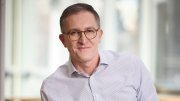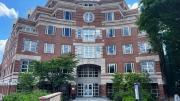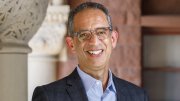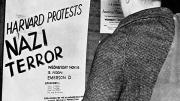Last summer, especially ambitious students enrolling for a Harvard professional education could have begun work simultaneously on their M.B.A., J.D., and Ed.M. degrees while the University was out of session. That possibility is, thankfully, impractical—and contrary to the intent of what is in fact a promising advance in post-college education. Several schools have deployed online instruction during the months before matriculation to introduce managers-, lawyers-, and teachers-to-be to the vocabulary, skills, and teaching styles they will encounter in the classrooms at the business, law, and education schools.
These summer experiences hold the potential for at least two significant educational gains central to the University’s mission. First, they equip students to learn from day one: an investment in their intellectual productivity, as they embark on expensive professional degrees. Second, they assure that increasingly diverse student cohorts—from different socioeconomic backgrounds (and increasingly, countries), college concentrations, and prior work—embark on their learning with some common preparation: a commitment to more fully inclusive schooling at Harvard. Over time, such instruction may be introduced by other University faculties, adopted by other institutions, and even offered for sale (the three-course business sequence already is).
• CORe. Harvard Business School (HBS) was first out of the gate, adapting its online Credential of Readiness (CORe) program, the flagship offering from Harvard Business School Online, for summer instruction of entering M.B.A. candidates who need to acquire or refresh certain foundational skills to prepare for the first-year required curriculum. CORe involves demanding courses in:
business analytics, taught by Phillips professor of manufacturing Jan Hammond, covering data, sampling and confidence intervals, hypothesis-testing, linear regression, and multiple regression—the basic statistical toolkit;
economics for managers—on customers’ willingness to pay and demand, ways to influence demand, supply and cost, markets, competition, and product differentiation—taught by Byers professor of business administration Bharat Anand (who as vice provost for advances in learning oversees University online learning); and
financial accounting, taught by Casserly professor of business administration V.G. Narayanan, who introduces accounting, financial statements, accruals and deferrals, cash-flow analysis, and forecasting and valuation—the basic language for understanding an enterprise’s performance and status.
By one estimate, serious engagement with the three-course sequence requires 170 hours. Along the way, the online learning system introduces the new students to the texture of HBS’s instruction method, with technological features emulating company case studies (how a ticket reseller figures out customers’ willingness to pay, and its pricing); frequent quizzes to test understanding of the material; ways to consult in real time with online classmates (as in a class discussion); discussion prompts and timed cold calls; and final examinations.
Christensen professor of business administration Jan W. Rivkin, who became chair of the M.B.A. program in July 2018, noted that CORe in a sense was simply a different way of delivering preparatory materials to students who need them. But, he said, HBS’s investment in such summer experiences and academic preparation had been “extraordinarily well received by students and faculty” members—anecdotal evidence, at least, that the program’s hefty time demands are worthwhile.
Although its effects have not been rigorously tested in a controlled experiment, he said, “The one thing we do know is that those who do better on the CORe final diagnostic do get higher exam grades on the required accounting and technology and operations management courses. Something big is learned there.” Exposure to the contents and case-method pedagogy “gets you used to it” and “gets you excited about it.” Because today’s HBS M.B.A. students are internationally diverse, from many different undergraduate traditions, and arrive in Allston with “broader backgrounds” in academic concentrations and prior business experiences, compared to past cohorts, CORe’s acculturating effects are, at a minimum, likely important for their comfort with and academic productivity in their first classes.
• Zero-L. Harvard Law School (HLS) aims explicitly at making students feel comfortable and at home through its puckishly named online program, run for the second time this past summer. The introductory module opens with a photo of an expressway on-ramp, and the 10 hours or so of short videos mix lectures and conversations with a wide array of faculty members, all of them at pains to speak personally and even humorously. Attwood and Williams professor of law I. Glenn Cohen, who led the faculty development team, jokes about his favorite federal statute (your pig wanders into fenced-in public areas: look it up); and in perhaps the bravest performance, Story senior lecturer on law Susan M. Davies introduces federal legislation by singing the Schoolhouse Rock lyric about how a bill becomes a law.
Although there is plenty of legal content, the focal points of the program are not so much substantive as instructional. An 11-module sequence shows how to read and brief a case (students are reassured that, specialized though it may seem, such close reading is not “discontinuous with what you’ve been doing your entire academic career”). And an eight-module mock classroom, conducted by Cohen and four upper-class students, illustrates the Socratic method. In the previous unit, Watson professor of law Jeannie Suk Gersen tells Cohen that being called on to speak out in class “was definitely one of my sources of anxiety,” before going on to explain that the intent, nowadays anyway, is to be “nurturing and supportive,” not imperious.
In the final module, Cohen talks with John F. Manning, who started the program shortly after becoming dean in mid 2017. Recalling his own nervousness as the first member of his family to graduate from college and go to law school, the dean said the best advice he got about his own sense of insecurity came from his mother, who told him, “[D]on’t compare your insides to other people’s outsides.”
Assessing the program’s aims and early results, Cohen recalled his own 1L experience as the most intellectually stimulating year of his life—but also the “most overwhelming,” a “baptism by fire.” Explaining everything from the structure of the U.S. legal system (one-sixth of entering J.D.s are from other countries) to varieties of professional practice—and embedding the contents in HLS’s pedagogy—enables students to acquire a sense of their forthcoming curriculum. And all 1Ls know that their peers have been exposed to the same material in the same way—which helps some overly wound-up matriculants relax and learn more naturally. An analysis of student comments yielded “prepared” and “excited” as the top descriptions.
• HPL. The Graduate School of Education (HGSE) is two summers into pilot-testing How People Learn (HPL), an entry-level, online program for master’s students. It aims to produce “a common core experience for all incoming master’s students at HGSE. The course will focus on connecting the science of learning and human development to professional practice in education across roles.”
This is an ambitious project, and one in which the school itself is the student. “Education” encompasses many possible professional paths, and there is far more disagreement on what an educator—as compared to, say, a law student—needs to know. Indeed, the definition of the profession, and how best to prepare HGSE degree candidates, are the subject of considerable work within the school now, as it considers its 13 Ed.M. tracks and determines what core competencies (in, say, data analysis, cognitive and learning science, management and leadership, and policy) the students enrolled in future master’s programs may need to acquire.
In this sense, HPL and HGSE’s curriculum are simultaneously being built anew, shaping each other. Enrolling master’s candidates may be even more diverse in background and interests than those headed for HBS and HLS, and so may especially need common preparation for their Cambridge studies—which are compressed into a single year on campus, rather than two and three at HBS and HLS, respectively. What could be more appropriate than their doing so at a place that is itself demonstrably a learning organization?
An in-depth report on these programs and their possible application elsewhere at and beyond Harvard appears at harvardmag.com/on-ramps-19.








